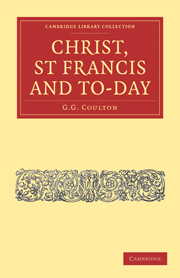Summary
TWO questions raised in discussion by members of my audience are so fundamental that they require separate treatment here.
(A) My definition of Christian on p. 17 was disputed. Some hearers contended that the belief in Christ's divinity is an essential part of Christianity, and that no creed lacking this belief could truly be called Christian; it was claimed that the belief in Christ as God is already recorded in the Epistle to the Hebrews, and has never ceased to be of the essence of Christianity.
This contention involves one obvious difficulty on the very threshold. It is certainly usual to reckon modern Unitarians among Christian bodies; and it is common also to apply the term to the ancient Ebionites and Arians, who denied or doubted the absolute divinity of Christ. Nor is this merely a loose way of speaking; for in Canon Law these two latter are reckoned, not among pagans or Jews, but among heretics, though the Ebionites are called semijudaei (Gratian, Decret. pars 11, Causa xxiv. q. 3). Indeed, the official church herself has shown the greatest reluctance to clear away loose ideas on this subject by exact definition. The Catholic Dictionary says (3rd ed. p. 158): ‘Probably the heathen at Antioch mistook Christus for a proper name, and called the disciples Christiani just as they called those who adhered to Pompey's party Pompeiani. …
- Type
- Chapter
- Information
- Christ, St Francis and To-day , pp. 162 - 171Publisher: Cambridge University PressPrint publication year: 2010First published in: 1919

